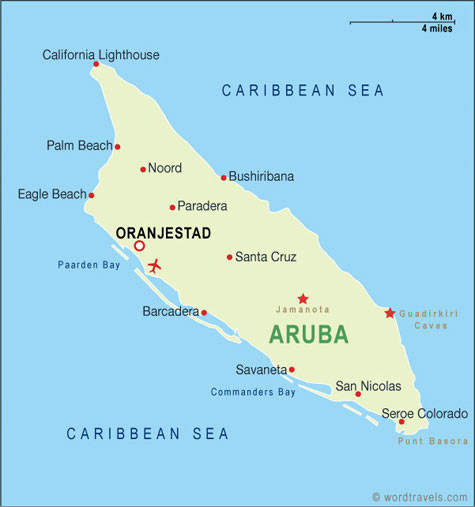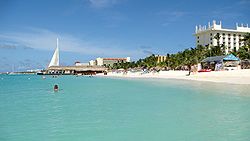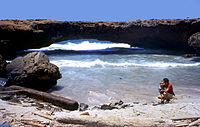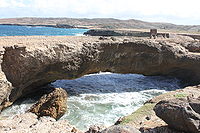|
List of
Banks in the Caribbean
List of Banks in Aruba
Aruba is a 33-kilometre (21 mi)-long
island of the Lesser Antilles in the southern Caribbean Sea, located 27
kilometres (17 mi) north of the coast of Venezuela. Together with
Bonaire and Curaçao, it forms a group referred to as the ABC islands of
the Leeward Antilles, the southern island chain of the Lesser Antilles.
Aruba, which has no administrative subdivisions, is one of the three
countries that form the Kingdom of the Netherlands, together with the
Netherlands and the Netherlands Antilles. Aruban citizens hold Dutch
passports. Unlike much of the Caribbean region, Aruba has a dry climate
and an arid, cactus-strewn landscape. This climate has helped tourism as
visitors to the island can reliably expect warm, sunny weather. It has a
land area of 193 square kilometres (75 sq mi) and lies outside the
hurricane belt.

Aruba Bank N.V.
Address: Camacuri 12
Mailing Address: P.O. Box 192
Phone: (297) 527-7725
Fax: (297) 527-7745
Aruban Investment Bank N.V. /AIB Bank
Address: Wilhelminastraat 34/36
Phone: (297) 582-7327
Fax: (297) 582-7461
Banco di Caribe N.V.
Address: Vondellaan 31
Mailing Address: P.O. Box 493
Phone: (297) 583-2168
Fax: (297) 583-2422
Keywords: Money
Caribbean Credit Corp.
Address: L.G. Smith Boulevard 116-B
Phone: (297) 582-3949 / (297) 583-7511 / (297) 582-1873
Caribbean Mercantile Bank N.V.
Address: Caya G.F. Betico Croes 53
Mailing Address: P.O. Box 28
Phone: (297) 582-3118 / (297) 583-6533
Fax: (297) 582-4373 / (297) 584-3535
Caribbean Mercantile Credit Company N.V.
Address: L.G. Smith Boulevard 116
Mailing Address: P.O. Box 601
Phone: (297) 582-1873 / (297) 586-0593 / (297) 584-6804
Fax: (297) 582-5116
Centrale Bank van Aruba
Address: J. E. Irausquin Blvd. 8
Phone: (297) 525-2100 / (297) 525-2101
Fax: (297) 583-2251 / (297) 583-7473
First National Bank of Aruba
Address: Caya G.F. Betico Croes 67
Mailing Address: P.O. Box 184
Phone: (297) 583-3221 / (297) 583-3224 / (297) 586-0005
Fax: (297) 582-1756 / (297) 582-3121
Interbank Aruba N.V.
Address: Caya G.F. Betico Croes 38
Phone: (297) 583-1080
Fax: (297) 582-4058
Ohra Hypotheekbank N.V.
Address: L.G. Smith Boulevard 62 Marisol Building.
Phone: (297) 583-9666
Fax: (297) 583-9498
RBTT Bank Aruba N.V.
Address: Caya G.F. Betico Croes 89
Mailing Address: P.O.Box 391
Phone: (297) 588-0101 / (297) 582-1515
Fax: (297) 582-1856 / (297) 583-9450
Sociale Verzekeringsbank
Address: L.G. Smith Boulevard z/n
Phone: (297) 587-3158
Fax: (297) 587-2783 / (297) 587-2787
Western Union
Address: L.G. Smtih Boulevard 142
Mailing Address: P.O. Box 656
Phone: (297) 582-2473 / (297) 582-4400
Fax: (297) 582-3012
  
Economy: Aruba enjoys one of the highest
standards of living in the Caribbean region; the low unemployment rate
is also positive for Aruba. About three quarters of the Aruban gross
national product is earned through tourism or related activities. Most
of the tourists are from Venezuela and the United States (predominately
from eastern and southern states), Aruba's largest trading partner.
Before the "Status Aparte" (a separate completely autonomous country/state
within the Kingdom), oil processing was the dominant industry in Aruba
despite expansion of the tourism sector. Today, the influence of the oil
processing business is minimal. The size of the agriculture and
manufacturing sectors also remains minimal.
The GDP per capita for Aruba is calculated to be $23,831 in 2007; among
the highest in the Caribbean and the Americas. Its main trading partners
are Venezuela, the United States and Netherlands.
Deficit spending has been a staple in Aruba's history, and modestly high
inflation has been present as well. Recent efforts at tightening
monetary policy are correcting this and will have its first balanced
budget in 2009. Aruba received some development aid from the Dutch
government each year, up until 2009 as part of a deal (signed as "Aruba's
Financial Independence") in which the Netherlands gradually reduced its
financial help to the island each successive year. The Aruban florin is
pegged to the United States dollar, with a fixed exchange rate where
1.77 Florin equals 1 U.S. dollar. In most stores near Oranjestad, the
exchange rate is 1.75 florin equals U.S 1 dollar
In 2006 the Aruban government has also changed several tax laws to
further reduce the deficit. Direct taxes have been converted to indirect
taxes as proposed by the IMF. A 3% tax has been introduced on sales and
services, while income taxes have been lowered and revenue taxes for
business reduced with 20%. The government compensated workers with 3.1%
for the effect that the B.B.O. would have on the inflation for 2007. The
inflation on Aruba in 2007 was 8,7%.
Language can be seen as an
important part of island culture in Aruba. The cultural mixture has
given rise to a linguistic mixture known as Papiamento, the predominant
language on Aruba. The official language is Dutch. The local language
used by its inhabitants is Papiamento and is a language that has been
evolving through the centuries and absorbed many words from other
languages like Dutch, English, French, diverse African dialects, and
most importantly, from Portuguese and Spanish. However, like many
islands in the region, Spanish is also often spoken. English has
historical connections (with the British Empire) and is known by many;
English usage has also grown due to tourism. Other common languages
spoken based on the size of their community are Portuguese, Chinese,
German and French. The latter is offered in high school and college,
since a high percentage of Aruban students continue their studies in
Europe.
In recent years, the government of Aruba has shown an increased interest
in acknowledging the cultural and historical importance of its native
language. Although spoken Papiamento is fairly similar among the several
Papiamento-speaking islands, there is a big difference in written
Papiamento. The orthography differs per island and even per group of
people. Some are more oriented towards the Portuguese roots and use the
equivalent spelling (e.g. "y" instead of "j"), where others are more
oriented towards the Dutch roots.
In a book The Buccaneers of America, first published in 1678, it is
stated by eyewitness account that the Indians on Aruba spoke "Spanish".
The oldest government official statement written in Papiamento dates
from 1803.
Aruba has four newspapers published in Papiamento: Diario, Bon Dia, Solo
di Pueblo and Awe Mainta and two in English : Aruba Today and The
News. Amigoe is the newspaper published in Dutch. Aruba also has 18
radio stations (2 AM and 16 FM) and three local television stations
(Tele-Aruba, Aruba Broadcast Company and Channel 22).
CENTRALE BANK VAN ARUBA & THE FINANCIAL
SYSTEM
The establishment of a central bank and the issue of a national
currency on the 1st of January 1986 marked the beginning of a separate
financial system for Aruba. Besides the Central Bank, the financial
system mainly consists of five commercial banks, (as of October 2001),
two US-based offshore banks, and other bank-like institutions of which
the most important are OHRA Hypotheekbank N.V., Fundacion Cas pa
Comunidad Arubano (FCCA), Aruban Investment Bank N.V., and island
Finance Aruba N.V. The institutional investor’s sector comprises life
insurance companies, and general (non-life)
insurance companies operating in or from Aruba.
CENTRALE BANK VAN ARUBA
The Centrale Bank van Aruba is a legal entity in itself (sui generis)
with an autonomous position within Aruba’s public sector. The Bank
started its operations on January 1, 1986, when Aruba obtained its
status as an autonomous country within the Kingdom of the Netherlands.
With the inception of the Bank, the Aruban florin was brought into
circulation,
pegged to the U.S. dollar at a rate of AFL 1.79 = US$ 1.00. This
exchange rate has remained unchanged since then. The mission of
the Bank is to maintain the internal and external value of the florin
and to promote the soundness and integrity of the financial system, to
be accomplished by
motivated and qualified employers, for the general benefit and well
being of the people of Aruba.
The Central Bank’s tasks and mission
The principal tasks of the Central Bank, as stipulated in the Central
Bank Ordinance are to:
• Conduct monetary policy;
• Supervise the financial system;
• Issue bank notes;
• Issue coins on behalf of the government;
• Act as the banker for the government;
• Be the central foreign exchange bank and, as such, regulate the flow
of payments to and from other countries;
• Advise the Minister of Finance on financial matters.
The Bank performs these tasks through a
variety of activities, which include:
• Formulating and implementing monetary policy and related measures
through, among other things, regulating bank credit and liquidity;
• Supervising the activities of the commercial banks and other financial
institutions by, inter alia, monitoring their liquidity and solvency to
protect the interests of depositors and policy holders, and to maintain
monetary and financial stability and financial integrity in Aruba;
• Managing Aruba’s official gold and foreign exchange reserves;
• Regulating international payments according to the State Ordinance on
foreign exchange transactions (A.B. 1990 No. GT 6);
• Bringing bank notes into circulation to meet the needs of businesses
and the general public;
• Issuing treasury bills and government bonds as an agent for the
government; and • Monitoring economic and financial developments.
FOREIGN EXCHANGE REGIME
The Centrale Bank van Aruba deals with the local foreign exchange banks
within a margin of 0.0279 percent. Accordingly, the Bank’s buying and
selling rates for the U.S. dollar are, respectively, AFL 1.7895 and AFL
1.7905. The rates for other main currencies against the Aruban florin
are set on a daily basis using the exchange rate of the U.S. dollar vis-à-vis
other major currencies as the basis for calculation.
FOREIGN EXCHANGE REGULATIONS
Foreign Exchange Transactions Pursuant to the State Ordinance on foreign
exchange transactions (AB 1990 no. GT 6), the bank is responsible for
the implementation of the regulations concerning foreign exchange
transactions for the account and risk of the government. These
regulations aim at monitoring and regulating the inflows and outflows of
foreign currencies. Payments to and receipts from nonresidents may be
made in any convertible currency.
Licenses
As of January 1, 1997, all current transactions with nonresidents may be
executed freely. When transferring company profits, a declaration of the
Bank should be obtained (among other things by submitting proof, e.g.,
annual accounts) stating that these profits were actually realized.
As of July 1, 1998, a general license was issued that allows resident
natural persons to carry out capital transactions (loans, investments,
and other capital transfers) with nonresidents up to a maximum amount of
AFL 200,000 per calendar year. For resident entities, capital
transactions higher than AFL 500,000 still require a special license.
These licenses are generally granted liberally. The amounts were
increased as of July 1, 2002, to respectively, a maximum amount of AFL
300,000 per calendar year for capital transactions with nonresidents,
and for resident entities, the capital transactions were increased to an
amount of AFL 750,000.
Investment regime for institutional investors (40-60 percent rule)
All institutional investors operating in Aruba, being life insurance
companies, pension funds, and saving funds, are required by the Bank to
invest a certain amount locally. The amount is related to the total
liabilities (excluding shareholder’s equity) of the institutional
investor, and is based on a progressive scale of 40, 50, and 60 percent.
Nonresident accounts
Nonresidents are free to open accounts (nonresident accounts) in any
foreign currency at a local commercial bank. They are also allowed to
hold bank accounts denominated in Aruban florin.
Conversion into Aruban florin
Proceedings from the export of goods and services must be converted into
Aruban florin or credited to a foreign currency denominated account
within eight working days after receipt, unless a special exemption is
obtained from the Bank.
Import and Export of Aruban florin
Nonresidents are allowed to bring into Aruba any amount of checks, or
bank notes denominated in foreign currency. The exportation of cash in
Aruban florin is prohibited, apart from certain small accounts for
travel purposes.
FOREIGN EXCHANGE TAX
The Sate Ordinance on foreign exchange commission stipulates that
residents must, in general, pay a 1.3% tax on payments to nonresidents.
Transactions in Netherlands Antillean guilders are exempted, on the
basis of an agreement between the two governments concerned. Certain
groups of companies (mainly government-related) are also exempted. This
was by virtue of the State Decrees on foreign exchange commission
exemption of July 1998 and October 2001, respectively. Additionally,
based on article 12 of the State Ordinance on the free zone of July
2000, the companies concerned may request an exemption to the extent
that their payments for
goods and services are linked to re-exports. Offshore companies and
Aruba Exempt Corporations (the so-called AVV’s) are by law
considered nonresidents and, thus, are not subject to this commission.
Pursuant to article 4 of the State Ordinance on foreign exchange
commission, the government is responsible for determining the policy
with respect to the foreign exchange commission, while the Bank is
entrusted with the collection thereof. In 2001, total collections rose
by 2% to AFL 24.4 million. Because of transitorial items, AFL 24.8
million was transferred to the Treasury. The share of this commission in
total tax receipts edged up from 3.8% to 4.1%.
FOREIGN EXCHANGE RESERVES
At year-end 2001, the total amount of foreign reserves of Aruba (excluding
revaluation differences of gold and official foreign exchange reserves)
amounted to US$ 373.9 million.
SUPERVISION OF FINANCIAL INSTITUTIONS
The Bank is entrusted with the prudential supervision of the Banking and
insurance sector as well as the company pension funds. This prudential
supervision aims at preventing financial institutions from taking risks
that could harm the interests of depositors and policyholders, and
endanger the stability of the financial system. To that end, continuous
off-site surveillance and periodic, risk-oriented on-site examinations
are conducted. Furthermore, regular bilateral meetings are held with the
institutions in
concern, as well as with the representative organizations to discuss
supervisory matters.
Depending on the type of financial institution, detailed reports are
submitted to the Bank on a weekly, monthly, quarterly, and/or annual
basis. Furthermore, each institution is required to file its own annual
audited financial statements and the management letter issued by its
external auditor. The Bank analyzes these documents and discusses its
findings with senior management of the institution.
COMMERCIAL BANKS
There are Currently five commercial banks operating in Aruba. One is a
branch and one a subsidiary of respectively, Banco di Caribe N.V. and
Maduro and Curiel’s Bank N.V., both established in Curaçao. Thus, two of
these five banks also are supervised (on a consolidated basis) by the
Bank van de Nederlandse Antillen.
The following commercial banks are currently active in Aruba:
• Aruba Bank NV;
• Banco di Caribe NV;
• Caribbean Mercantile Bank NV;
• Interbank Aruba NV;
• RBTT Bank Aruba N.V.
The aggregated balance sheet total of the five commercial banks
increased by 6 percent to AFL 2,430 million at the end of 2001
equivalent to 71 percent of estimated Gross Domestic Product (GDP).
Loans granted in 2001 grew by AFL 41 million or 3 percent to AFL 1,599
million, compared to a 13 percent increase in 2000. Loans to individuals
increased by 7 percent, while the commercial loans decreased by AFL 15
million or 2 percent. The latter is mainly as a result of the subdued
business activities.
On the liability side, deposits rose by AFL 102 million or 5 percent.
Capital and reserves increased with AFL 56 million or 6 percent.
As a result, the banks’ aggregated risk
weighed capital asset ratio increased from 8.1 percent in 2000 to 10.6
percent at the end of 2001, well above the minimum capital requirements
of 8 percent, adopted by the Basel Committee on Banking Supervision.
Compared to 2000 there was a substantial increase in the banks’
liquidity ratio by 4 percentage points to 28 percent well above the
minimum prudential requirement of 20 percent.
SOURCES:
Brochure of Centrale Bank van Aruba,
Tasks & Activities 2000
Annual Report 2001, Centrale Bank van Aruba,
Annual Report and Financial Statements for the year 2001
Havenstraat 2, Oranjestad, Aruba
Phone: (297) 822509
Fax: (297) 832251
E-Mail: cbaua@setarnet.aw
Website: www.cbaruba.org
ARUBAN INVESTMENT BANK
The Aruban Investment Bank N.V. (AIB), a private corporation, is a
result of the joint efforts of the Government of Aruba and the private
sector compromising international banks, local banks, insurance
companies, pension funds, corporations and the people of Aruba.
The total subscribed capital of the Bank amounts to AFL 14,967,000 as
per December 31, 1987 and is fully paid up. For increasing its financial
resources the Government of Aruba has originally granted the Bank a
subordinated loan sum of AFL 20,000,000.
The year 2000 witnessed a substantial growth in the loan and investment
activities of the Aruban Investment Bank N.V. These activities grew by
58% from AFL 60 million in 1999 to AFL 95 million for the year 2000.
The Bank has been successful in its approach to team up with
institutional investors in order to attract the long term funding,
essential for the growth of the loan and investment activities. The
borrowings of the Bank grew from AFL 29.6 million in 1999 to AFL 65.4
million in the year 2000, an increase of 120 %.
This directory is published solely as a
courtesy. We assume no responsibility or liability for the accuracy or
completeness of the listings or other information in the directory nor does we
assume any obligation to update this information. The data contained in this
directory has been compiled from a number of sources, however, we have not
independently verified the data. Therefore you may wish to verify the data with
your Bank institution.
Get your own Bank account with ATM card
(Maestro/Mastercard debit card) for withdrawals with a Bank in the Caribe
|




